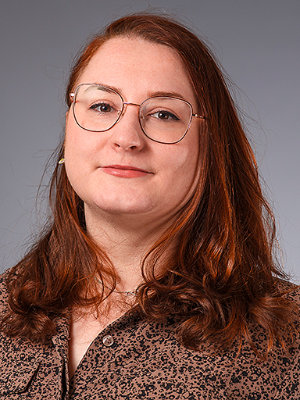Dr. Paula GrozaWritten by: WAN Yuk Kei  Congratulations to Dr. Paula Groza, who recently completed her PhD in May 2024 at Umeå University in Sweden! Hailing from Romania, Dr. Paula Groza received her Bachelor's degree in Agricultural Biotechnology and her first Master's degree in Applied Biotechnology from the University of Agricultural Science and Veterinary Medicine of Cluj-Napoca. She enjoyed studying at the Faculty of Animal Science and Biotechnology, where she remembered, “At the end of my first Master's program, which I did in Romania, I fell in love with the world of RNA.” With the encouragement from her professors to further her studies, Dr. Paula Groza did an ERASMUS Plus Internship in Dr. Michela Denti's lab at the University of Trento in Italy, where she gained an interest in microRNA and feed-back or feed-forward loops’ potential to regulate gene expression. She then came to Umeå University to pursue another Master's in Molecular Biology and ended up in Dr. Francesca Aguilo's lab, where she started her PhD, studying the role of fibrillarin, a methyltransferase that catalyzes the deposition of the RNA modification 2’-O-methylation on ribosomal RNA. Dr. Groza hopes to share with us her fascination with translation and ribosomal heterogeneity from her project soon. Starting her journey in the RNA world by working on microRNA, Dr. Groza was first fascinated by microRNA’s ability to control gene expression. After several years into her RNA journey, “[she finds] many RNA types intriguing, and [she loves] the versatility of RNA molecules in general.” As she witnessed the functional versatility of small nucleolar RNAs (snoRNAs) during her PhD, snoRNAs became her favorite RNA. Not only does Dr. Groza have a favorite type of RNA, but she also has a favorite RNA modification – without a doubt, 2’-O-methylation. The RNA Journal article “The shift from early to late types of ribosomes in zebrafish development involves changes at a subset of rRNA 2’-O-me sites” by Ramachandran et al. published in 2020 amazes her with the big implications caused by small chemical marks on cellular and organismal fate.
As Dr. Groza just finished her PhD, she described that her “academic journey was a bit more peculiar than the normal routes people take.” She got rejected on her first attempt applying to PhD positions, yet she finds the feedback from group leaders who interviewed her helpful in figuring out her next steps. Dr. Groza also noted that most Eastern European students’ lack of financial support hinders them from pursuing their dreams. She is thankful that she was fortunate to work full-time remotely as a scientific curator at Ingenuity Systems, a Qiagen company, while doing her master’s full-time in Umeå, where she gained six months of practical research experience, preparing her well for her PhD. Dr. Groza recalled the tough times when she was juggling two full-time commitments at the beginning of her academic journey. She advises students who are just starting their journeys to “remind themselves what fueled them to pursue this route” and to choose a laboratory wisely by finding out what the group leader prioritizes and whether the PhD training aligns with their interests. Dr. Groza said the most significant challenge she faces in her career, like many others, is impostor syndrome, which sometimes takes the form of a self-depreciating ‘internal monolog’ that minimizes your successes while focusing on and maximizing your shortcomings. She also noted that social media’s often one-sided achievement-only narrative exacerbates the self-depreciation issue in science. She is actively fighting this by maintaining a positive attitude to learn from every experience, not taking criticism and rejections personally, and understanding her current limitations to improve in those areas. As a firm mental-health first advocate, Dr. Groza believes that prioritizing rest and recovery by having a life outside the lab is vital. She truly admires mom scientists who lead labs with passion and commitment. One of whom she worked closely with is her PhD supervisor, Dr. Francesca Aguilo, who built a lab successfully while raising two children. Dr. Groza enjoys literature, poetry, and writing in her free time. Her love and talent for writing led her to join the RNA Spotlight team, where she contributes as both a writer and editor. She is inspired by the stories of fellow scientists she has written about, motivating her to keep her going during her PhD. Attending one of the RNA Society Annual meetings is still on her bucket list. However, she remembers the excitement of listening to inspiring talks from various subfields in RNA during the Nordic RNA Society meeting in 2019, which was the first conference on RNA she had ever attended. She highlighted that among the inspiring speakers was the now senior editor of the RNA Journal, Prof. Eric M. Phizicky, who captivated her with his excitement for the RNA field, fueling her drive as she started her PhD. Hopefully, we will see her in future RNA Society meetings! Follow Dr. Paula Groza on X (@Pa_Uuu) and LinkedIn to stay updated with her latest research insights and experiences. Finally, Dr. Groza is currently on the job market where she would like to focus on research questions centered around ribosome heterogeneity, translation, and/or RNA modifications in regulating gene expression, ideally within the EU. She's open to exploring both industry and academic career paths, as long as she can apply (and continue to expand) her expertise in RNA biology. |
